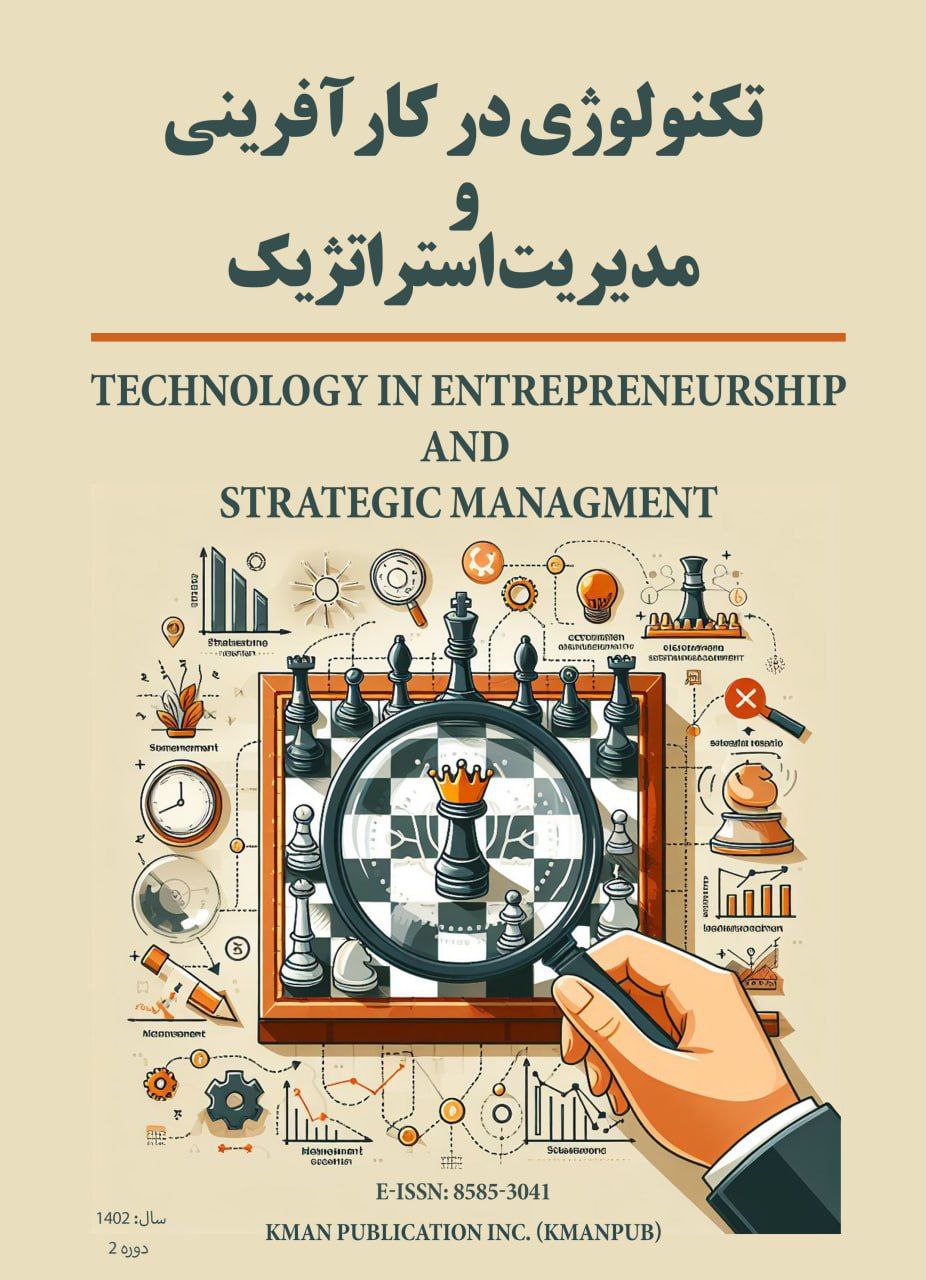A Paradigmatic Model of Reverse Logistics Supply Chain for Industrial Waste Management: A Qualitative Study
Keywords:
Reverse logistics supply chain, industrial wastewater, national gas refining industry, grounded theoryAbstract
The rapid advancement of technology in achieving new production processes, the replacement of synthetic materials, and chemical compounds have led to an increase in the volume of industrial waste, and in some cases, the generation of hazardous waste. Improper handling, transportation, and disposal of industrial waste, part of which includes hazardous materials, have caused significant problems for humans and the environment. In such circumstances, the existence of a reverse logistics network becomes essential. On the other hand, today, largely due to increasing social concerns about the environment, the term "reverse logistics" has become closely associated with waste management. In fact, industrial waste management can be considered one of the reverse logistics issues within supply chain management. In the present study, a qualitative investigation was conducted to propose a reverse supply chain model for managing the waste from the national gas refining industry. This research employed the grounded theory method of Strauss and Corbin (1998) and proceeded until theoretical saturation of the interviewees was reached. The statistical population was purposefully selected from academic experts and specialists in the national gas refining industry. The opinions of 17 experts and specialists in the field were gathered through semi-structured in-depth interviews and analyzed using the qualitative grounded theory method. In the end, 45 components were selected from the interview texts, grouped into six categories, and presented as part of a paradigmatic model.
Downloads
References
Abdissa, G., Ayalew, A., Dunay, A., & Illés, C. B. (2022). Role of Reverse Logistics Activities in the Recycling of Used Plastic
Bottled Water Waste Management. Sustainability, 14(7650). https://doi.org/10.3390/su14137650
Gao, J., Xiao, Z., & Wei, H. (2021). Competition and coordination in a dual-channel green supply chain with an eco-label
policy. Computers & Industrial Engineering, 153. https://doi.org/10.1016/j.cie.2020.107057
Islam Panah, A., Jafar Nejad Chogoshi, A., Heydari Dehui, J., & Taghi Zadeh Yazdi, M. (2023). Designing a reverse supply
chain network for industrial waste using intelligent vehicular ad hoc networks (VANET): A case study of the automotive
industry in Iran. Civilica, https://civilica.com/doc/1871347
Jafari, P., Fahimi Nejad, A., Morsal, B., & Tayebi Sani, S. M. (2020). Study of barriers affecting the formation of reverse
logistics in sports events. Journal of Physical Education and Sport Sciences, 1-15. https://civilica.com/doc/1211523/
Khosravi, M. R., Homayi, R., & Hoorali, M. (2019). Designing a conceptual model for reverse logistics network management
with a focus on supply chain innovation. Innovation and Value Creation, 8(16), 1-15.
https://www.sid.ir/fa/journal/ViewPaper.aspx?id=558355
Mir Aghai, S. S. (2020). The impact of integrated reverse logistics on green supply chains with an emphasis on environmental
factors. First Conference on Industrial Engineering, Economics, and Management, https://civilica.com/doc/1025881/
Mugoni, E., Nyagadza, B., & Hove, P. K. (2023). Green reverse logistics technology impact on agricultural entrepreneurial
marketing firms' operational efficiency and sustainable competitive advantage. Sustainable Technology and
Entrepreneurship, 2(2). https://doi.org/10.1016/j.stae.2022.100034
Najm, H., & Asadi Gangaraj, E. (2021). Design of a reverse logistics network for electronic and electrical waste: A case study
of Mazandaran Province. Fourteenth International Conference of the Iranian Operations Research Association, Mashhad.
https://en.civilica.com/doc/1365967/
Qazi Far, A. K., & Rasouli, K. (2021). Study of influential variables on reverse logistics and closed-loop supply chain in the
oil and gas industry of Gachsaran using hierarchical methods. Seventh International Conference on Management and
Accounting Sciences, Tehran. https://civilica.com/doc/1257747/
Rau, H., Budiman, S. D., & Monteiro, C. N. (2020). Improving the sustainability of a reverse supply chain system under demand
uncertainty by using postponement strategies. Waste, https://pubmed.ncbi.nlm.nih.gov/34126468/
Saxena, N., Sarkar, B., Wee, H. M., Reong, S., Singh, S. R., & Hsiao, Y. L. (2023). A reverse logistics model with eco-design
under the Stackelberg-Nash equilibrium and centralized framework. Journal of Cleaner Production, 387.
https://doi.org/10.1016/j.jclepro.2022.135789
Taheri, M. T., Maki Al Agha, M., & Samadiyar, H. (2022). Prioritizing and managing industrial waste in the ninth refinery of
South Pars Gas Complex. Environmental and Water Engineering, 8(4), 842-855.
https://www.jewe.ir/article_146971_c5df0e9b2abce6eb1af1e8d80c4a8780.pdf?lang=en
Tavakoli, N., Sharifi, M., Khani Ali, M., & Ghasemi Mobtaker, H. (2023). Evaluation and design of a forward-reverse supply
chain network for the Shiraz biogas power plant. Civilica, https://civilica.com/doc/1895755
Vaezi, N., & Shahbazi Chagni, Z. (2022). Network analysis of barriers to reverse logistics implementation in the paper
industries of Saveh County. First International Conference on Research in Accounting, Management, Economics, and
Humanities, https://civilica.com/doc/1533558/
Weraikat, D., Kazemi Zanjani, M., & Lehoux, N. (2016). Two-echelon pharmaceutical reverse supply chain coordination with
customers incentives. International Journal of Production Economics, 176, 41-52.
https://doi.org/10.1016/j.ijpe.2016.03.003
Yu, H., Sun, X., Solvang, W. D., & Zhao, X. (2020). Reverse Logistics Network Design for Effective Management of Medical
Waste in Epidemic Outbreaks: Insights from the Coronavirus Disease 2019 (COVID-19) Outbreak in Wuhan (China).
International Journal of Environmental Research and Public Health, 17(1770). https://doi.org/10.3390/ijerph17051770
Zarei, H., Omrani, Q., & Sabat Aghlidi, P. (2012). Formulating waste management strategies in oil and gas refineries (case
study: Shiraz Oil Refinery). Conference on Wastewater and Industrial Waste Management,
Downloads
Published
Submitted
Revised
Accepted
Issue
Section
License
Copyright (c) -1 Journal of Technology in Entrepreneurship and Strategic Management (JTESM)

This work is licensed under a Creative Commons Attribution-NonCommercial 4.0 International License.











